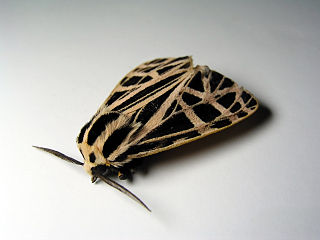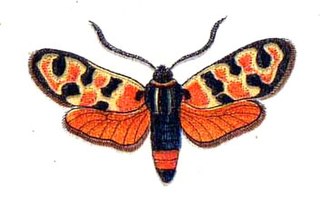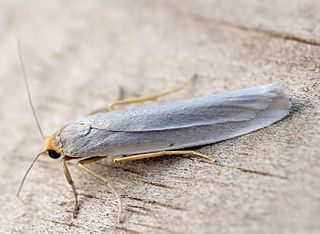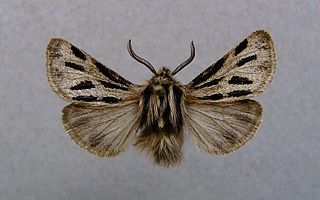
The Lasiocampinae are a subfamily of the moth family Lasiocampidae. The subfamily was described by Thaddeus William Harris in 1841.

The Callimorphina are a subtribe of woolly bear moths in the family Erebidae. The subtribe was described by Francis Walker in 1865. Many of these moths are easily confused with butterflies, being quite brightly colored and somewhat diurnal. Their antennae are not thickened into "clubs", which is a typical characteristic of butterflies.

Grammia is a genus of tiger moths in the family Erebidae. The genus was described by Rambur in 1866.

Zygaena fausta is a member of the family Zygaenidae, the day-flying burnet moths. Its bright aposematic colours of red, white and black on the wings indicate to possible predators such as birds that it is foul tasting or poisonous. In flight, the bright red abdomen is revealed, contrasting with the white legs and black head and antennae; the thorax is black and white with an eye spot on each side. There appears to be a considerable variation in pattern among specimens from different parts of Europe.

Eilema uniola is a moth of the subfamily Arctiinae first described by Jules Pierre Rambur in 1866. It is found in Spain, Portugal, France and Italy.

Paranthrene tabaniformis, the dusky clearwing, is a moth of the family Sesiidae. It is found in the Palearctic and Nearctic realms.

Ocnogyna is a genus of moths in the family Erebidae from western Eurasia. The genus was erected by Julius Lederer in 1853. One aberrant species, Ocnogyna parasita, has females with non-functional wings, and because of this was formerly placed in its own genus Somatrichia, but is now in Ocnogyna.
Omochroa is a monotypic moth genus in the subfamily Arctiinae. Its only species, Omochroa spurca, was described from Andalusia. Both the genus and the species were first described by Jules Pierre Rambur in 1866. The type was not saved. The species has affinity with Coscinia romei Sagarra, 1924.
Zethes is a genus of moths in the family Erebidae first described by Rambur in 1833.

Odice is a genus of moths of the family Erebidae. The genus was erected by Jacob Hübner in 1823.
Clethrogyna is a genus of tussock moths in the family Erebidae. The genus was described by Rambur in 1866.

Macrothylacia is a genus of moths in the family Lasiocampidae described by Rambur in 1866.

Cymbalophora pudica, the discrete chaperon, is a moth of the family Erebidae. The species was first described by Eugenius Johann Christoph Esper in 1784.

Lygephila lusoria is a moth of the family Erebidae. The species was first described by Carl Linnaeus in his 1758 10th edition of Systema Naturae. It is found in southern Europe, the Near East and Middle East, European south-eastern Russia, the Caucasus, Turkey and Israel.

Utetheisa lotrix, the salt-and-pepper moth or crotalaria moth, is a moth of the family Erebidae. The species was first described by Pieter Cramer in 1777. It is found in most of the Old World tropics.

Ocnogyna baetica, the winter webworm, is a moth of the family Erebidae. The species was first described by Rambur in 1837. It is found in Italy, the Iberian Peninsula and North Africa.

Zygaena sarpedon is a moth of the Zygaenidae family. It is found in France, Italy and on the Iberian Peninsula.

Eupithecia ericeata is a moth in the family Geometridae first described by Jules Pierre Rambur in 1833. It is found in most of southern Europe and the Near East.
Cymbalophora haroldi is a moth of the family Erebidae first described by Charles Oberthür in 1911. It is found in Morocco and Algeria.
Cymbalophora rivularis is a moth of the family Erebidae first described by Édouard Ménétries in 1832. It is found in central Italy, the Balkan Peninsula, western Iran, Dagestan, Armenia and western Azerbaijan.















